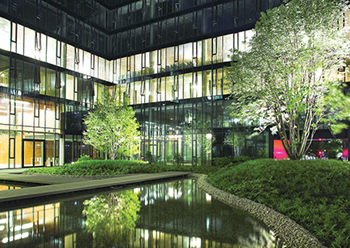Reynaers focuses on green credentials
01 June 2020
Underlining its commitment to supplying quality aluminium systems in the Middle East, Reynaers Middle East said its parent firm Reynaers Aluminium is increasingly sourcing its primary produced aluminium from green energy sources.
The European leader in architectural aluminium window, door and façade systems has made clear agreements with its suppliers, a decision that has a big impact on its carbon footprint.
“Reynaers Aluminium has chosen durable and sustainable electricity in the primary production of aluminium as it keeps improving its environmental impact,” Ali Khalaf, Managing director of Reynaers Middle East, told Gulf Construction.
The aluminium industry is constantly focusing on improving the carbon footprint of the aluminium production. A big part of this carbon footprint is related to the need for electricity in the production process.
“The aluminium used in Europe currently generates an average of 8.6 kg carbon dioxide (CO2) per kg of aluminium. The majority of this CO2 is attributable to the energy source. By using green electricity, the footprint can drop to 4 kg. This is what we call ‘low carbon primary aluminium’. With the decision to purchase low carbon primary aluminium, Reynaers Aluminium will realise a reduction of CO2 of more than 25 per cent (compared to reference volumes of 2019),” Khalaf explained.
The Hall-Héroult process, an electrolytic process, is used to break down aluminium oxide into primary aluminium. According to European Aluminium, the energy efficiency of this process has been improved by over 50 per cent in the last decades, he continued.
“The focus on improving the energy consumption during this process remains top priority, as this represents a large percentage of the cost of the aluminium production. In future, new innovations will ensure that the residual impact, next to the impact by the electricity input, can decrease even further,” he added.
Another sustainable property of aluminium is its recyclability. Unlike many other materials, aluminium keeps its durable characteristics in the recycling process. That means you can recycle it endlessly without any loss in quality. Recycling aluminium requires only five per cent of the original energy input, Khalaf said, adding this means avoiding 8 tons of CO2 emissions per ton of aluminium.
“The only limitation today is the availability of scrap material. Due to the long lifecycle of aluminium in many applications, the available aluminium scrap currently covers only 40 per cent of the world demand,” Khalaf pointed out. “This percentage will definitely grow due to, amongst other reasons, the worldwide renovation of buildings. Increasing the recycled content in particular products, however, will not affect the global environmental impact, as all available aluminium scrap is already being recycled to the maximum.”
The durability of aluminium is clearly recognisable by the very long usage of aluminium windows and doors in buildings. Aluminium is not affected by ultraviolet (UV) rays or moisture and doesn’t corrode or rot. “The lifecycle of aluminium windows and doors has an average of over 40 years, lifecycles of over 60 years are no exceptions. This long lifecycle of aluminium reduces the environmental impact – which is constantly being improved.”
Reynaers Aluminium is a leading European specialist in the development and marketing of innovative and sustainable aluminium solutions for windows, doors, curtain-walls, sliding systems, sun screening and conservatories.
Driven by innovation, the company focuses on energy-efficiency and taking responsibility for the environment. Apart from sourcing low carbon primary aluminium, Reynaers Aluminium continues to work on an optimal sustainability policy in house. Around the Reynaers Campus in Belgium, a large green zone has been developed that ensures optimal and sustainable water management. The company was also amongst the first to install solar panels on a large scale.
In addition, Reynaers Aluminium has, for years, been focusing on alternative and creative transport solutions for commuter traffic: from electric bicycles and car-pooling to company cars with low CO2 emissions. With this policy, Reynaers Aluminium has seen its CO2 footprint falling sharply over a short period. All initiatives relating to sustainability are encouraged throughout the company and yearly CSR awards are granted to the subsidiaries with the best projects for improving the sustainability of Reynaers.
Reynaers Aluminium is part of the Reynaers Group, which enfolds its several diverse companies in three business units, namely aluminium architectural solutions, steel architectural solutions and building products. Founded in 1965, the Reynaers Group is active in more than 70 countries worldwide with 40 subsidiaries and 2,200 employees.
Reynaers Middle East, headquartered in Bahrain since 2004, caters to the entire GCC region in addition to Jordan, Lebanon, Egypt and Iraq. It also has branch offices in the UAE and Egypt.
- Bahrain driving growth; awards $740m tenders
- Labour City project bids deadline extended
- Bapco upgrade work 50pc complete
- KNPC readies housing sites for expat workers
- Reynaers focuses on green credentials
- $6.7bn Liwa Plastics being commissioned
- Alba-Macrel partners with Kanoo Cranes
- In brief



